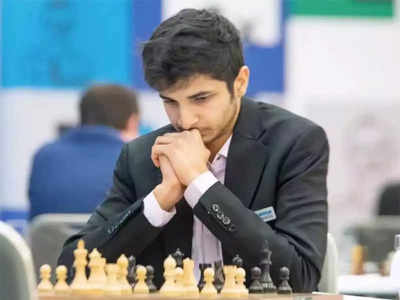Magnus Carlsen, the five-time world champion, was recently defeated by world number 19, who is now displaying rekindled confidence and unwavering vigour.
Even though he has a whopping 232k YouTube subscribers, 111k Instagram followers, and an additional 95k Twitter followers, Indian Grandmaster Vidit Gujrathi claims that nothing makes him happier than his own place.
The “extremely private” 28-year-old stunned the world last week by defeating five-time world champion Magnus Carlsen, joining a very select group of Indian chess greats that includes teenagers R Praggnanandhaa, D Gukesh, and Arjun Erigaisi.
Gujrathi joyously celebrated the victory, even though he said it wasn’t truly his greatest game in the Chess Pro League and he benefited from the Norwegian’s error (Carlsen missed a checkmate in three moves). When he was interviewed by The Indian Express following his victory, he didn’t give himself or his efforts much credit; instead, he kept repeating, “I could manage this only because of the sacrifices of my family.”
About twenty years have passed since a fiercely competitive six-year-old from Nashik, a city known for its vineyards, picked chess over cricket, a sport he only chose because he simply couldn’t beat his father at.
initial obsession
Gujrathi was asked to choose a sport by his parents, who are both doctors, so he could occupy himself while he waited for them to get home. They were pleased that he had chosen chess because it virtually eliminated the possibility of injury and because playing it is believed to enhance mental, memory, and mathematical abilities.
They had no idea how Gujrathi’s infatuation with the game would change their lives—he even started to repeat chess moves to himself while he slept!
His parents realised they needed to support his career considerably more when he won the U-11 national championships (and the following two age-group titles as well) and placed second in the U-12 Asian Youth Championships.
They had to pay for his coaching, which is by no means inexpensive, so money was tight. They also had to cover the cost of his trip to numerous competitions in India and overseas. But they persisted and took out numerous debts to support his dream.
But there was one issue: His parents were having trouble juggling the demanding schedules that come with being doctors.
Mother’s offering
His mother, a gynaecologist at the time, made the supreme sacrifice at that point by quitting her job to work as a beauty consultant. She could then take time off whenever she needed to, or as she once expressed it this way:
Nobody is in need of beauty help. Vedika, his younger sister, contributed significantly to his accomplishment. His sister had no choice but to go along because his mother had to go with him everywhere.
She had to spend the entire third day of some three-day events sitting in the hallway. She completed the task without grumbling. She still joins me for competitions and adds to the enjoyment, said Gujarathi. How close the two are may be seen by taking a quick peek at his Instagram profile.
Once Vidit attained Grandmaster status, things on the financial front began to improve. The weight started to lessen until he accepted a position with ONGC.
Finally, “jugaad’s” days were finished, according to Gujrathi. When you don’t have a lot of money, you really have to come up with creative ways to do everything, from eating to travelling. I can still picture how we would organise things. Now, everything is much better.
Gujrathi was able to establish a routine that worked for him despite the chaos that came with travelling for the majority of the year to compete in chess tournaments throughout the globe. The pandemic then began. Everything was altered by it.
I’m a reserved individual. I prefer to be alone. I simply paid attention to playing chess. I stopped there. But, I noticed that others began streaming their games and making game commentary when the pandemic struck in 2020.
That certainly piqued my interest,” he claims. Although it seems cliche, I truly am me. I’m not putting on a show. That’s why I believe I’ve gained so much notoriety. Chess broadcasting became extremely popular because it let spectators to view our other side. They realised we aren’t nerds after all. Well, we also have a wonderful sense of humour.
The number of online chess tournaments has increased since the outbreak. Gujrathi can finally get back into a routine even though most competitions, including the Chess Pro League, take place in the wee hours of the morning IST. Also, he enjoys routines.
Because of the late-night tournaments, I occasionally go to bed at 6 am. But I make sure to train in chess for seven hours every day, work exercise for at least an hour, find time for meditation, and read a book before bed,” he says.
He used to like playing basketball with his neighbourhood pals when he was younger. Nonetheless, because he is focused on being the best chess player in the world, he prefers to play games alone. He’s currently enthralled by the game of badminton.
“I try to play as many singles as I can. It’s because your performance determines the outcome of the game fully, and you can’t hold other players accountable if you lose. I’ve been in since
I’ve been playing with my buddies in Nashik since the beginning of this year, he says.
Gujrathi thrives on having complete control over the result. Including with regard to his website. “I make an effort to review anything before it appears online. even with regard to redesign. I’ve come to the realisation that people follow me because they enjoy me just the way I am, and the website ought to reflect that,” he says.
How does he fit in reading, streaming, and other interests in between playing badminton, practising chess, and spending time with his family?
I’ve been playing with my buddies in Nashik since the beginning of this year, he says.
Gujrathi thrives on having complete control over the result. Including with regard to his website. “I make an effort to review anything before it appears online. even with regard to redesign. I’ve come to the realisation that people follow me because they enjoy me just the way I am, and the website ought to reflect that,” he says.
How does he fit in reading, streaming, and other interests in between playing badminton, practising chess, and spending time with his family?
“All these years, I’ve developed the habit of reading a book before bed. I read a lot. A lot. The Holocaust survivor’s memoir “Happiest Man on Earth” is his current favourite book, he says. “I enjoy non-fictional novels that make you think about life,” he adds. Also, he enjoys reading Om Swami’s works a lot.
Gujrathi adds that he spends the most money on books besides chess.
He claims that the victory over Carlsen has given him newfound vigour, but being the top chess player in the world has always been the ultimate goal. “This victory has convinced me that I am capable of outplaying the world’s top chess players. I improved my defence, and
it is why he lost control and erred. It’s merely demonstrated that even the best can falter, and the difficulty of our game is about the same,” he remarked.
major year
Chess will have a strong year in 2023. The World Chess Championship, which begins in April, marks Carlsen’s first absence from competition since 2013. It also raises the question of why Indian chess players, who are so successful elsewhere, haven’t really been able to shine at the Candidates Tournament, which determines who will face the world champion. The awful scheduling in Candidates is the issue. They have the World Cup, which is a good competition to qualify for, but it does not their present shape.
The fact that inactive players don’t lose ranking is one of the game’s many drawbacks. It’s absurd in every way. For instance, Gary Kasparov would be World No. 2 if he came and played a traditional game. Nothing about it makes logic, he claims.
Modern age
Gujrathi claims that despite being a private person, he appreciates the popularity of the sport. “I was in Delhi the other day, and people approached me to talk. Never has it occurred before. This is quite promising because people of all ages are taking up the sport, he says.
It also has to do with how well-attended Rapids and Blitz events have become in recent years. Nonetheless, Gujrathi is ‘conventional’ in that regard.
“It (Rapids and Blitz) has gained a lot more popularity than I had hoped for. While the shorter formats are more about pragmatism, classical chess can include a lot of originality, innovative thought, and correctness.
Yet he can’t dispute that it’s much more enjoyable to see. “If you ask me, I’ll watch Blitz and play Classical. Well, that puts it to rest, he smirks. Gujrathi may be currently number 19 in the world, which he claims doesn’t matter, but with a newfound assurance and unwavering vigour, that may change. and shortly.

































